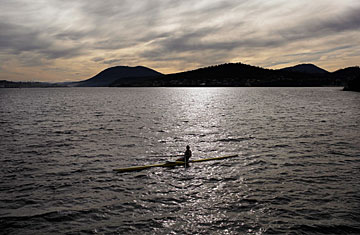
A brisk pre-dawn is Emmett's favorite time to fine-tune his style on the Derwent
David Emmett has at least one bad habit. In the course of a meal, he'll tap his prosthetic left eye with his knife or fork, producing a sound that proves to new acquaintances that this is no ordinary peeper. He enjoys the embarrassed revulsion, and will repeat the stunt later to elicit it again. He also composes some very mediocre limericks, which he'll write on the cards he sends to family on special occasions. On this morning, he delivers a halting recitation of one over breakfast. It's otherwise a pleasure to spend time with Emmett, for whom hardship has crystallized what's important in life, and who by practicing his ideas has become an inspiration to rowers across generations.
On his 21st birthday, as a naval cadet based in Sydney, Emmett was in a car crash that doctors believe would have killed him had he not, at the time, been as fit as a seal. The accident caused permanent brain damage, however. "Before it happened I was shy, the type who'd run and hide when the doorbell rang," he says. Now, he has a lack of inhibition, finds it hard to organize himself and has a lousy short-term memory. But the power of the words "brain damage" is misplaced in Emmett's case: on most counts he's as near to normal as the next person — with a whole lot more vim and, many might say, wisdom.
Now 53, Emmett is not a world-class rower, never has been and never will be. But he's a very good one, whose dedication and enthusiasm are legendary in local circles, particularly at the Lindisfarne Rowing club on the eastern shore of the Derwent River in Hobart. A typical day for the man known as the "King of the Derwent" starts at 5 a.m., when he wakes without fail with no help from an alarm. No need to worry about disturbing his wife of four years, Heather — she likes to rise at the same time, keen for a swim at the local pool or a phone chat with family in Canada. Emmett munches on half an apple and a piece of brown bread or date loaf before climbing on his pushbike to cycle the 8 km to the club. "I revel in running or riding across the [Tasman] Bridge," he says, "being passed by all those poor citizens dependent on their cars."
He's on the water by 5:30 and rows until 7:15, forever demanding more from his lungs while working on some finer point of technique. In rowing season, between October and May, Emmett has many companions on the water. But on this numbing winter morning he's alone. "Often there'll be snow on the mountains and hills around me," he says. "And in the evenings you get the most beautiful sunsets. I'm sometimes out there competing for space with the dolphins, who'll pretend to try to knock you out of your scull. They'll bounce up over your blades and you think you're going to hit them. You never do."
For Emmett, rowing is partly spiritual and partly about fitness — "I get off the water happy if my legs are burning through hard work." But more than both those things it's a competitive outlet for a man who won't go quietly. Though rowers become eligible for masters races at the ripe old age of 27, Emmett avoids them still. "My goal is to stay maximally competitive for as long as I can," he says. "I don't want to be seen as a lingering, loitering, gray-haired, fat, slack old rower at regattas. I will not pursue it when I'm like that. The sad thing about the whole thing is that I'm growing old extremely disgracefully."
That's not how others see it. His fellow rowers speak of Emmett as someone who endears himself to all he meets with his friendliness and willingness to help any rower — young, disabled — in need. "He's a fanatic," says Paul Christensen, president of the Tasmanian Rowing Council, " a rowing tragic who radiates passion for his sport."
Imbued with an unshakable love of life, Emmett has overcome the deficits inflicted by his accident. In the 1980s, his 50 First Dates memory made cramming for his speech-pathology exams tough, but countless nights spent in the library allowed him to complete the three-year course in six years, and these days he runs his own practice. "Another consequence of my accident is that I have little respect or time for material things," he says. "I lose things, so the fewer possessions I have, the easier life is. Time with people, with my wife, especially — and rowing — are what matter to me." Emmett is many things; a man growing old disgracefully isn't one of them.